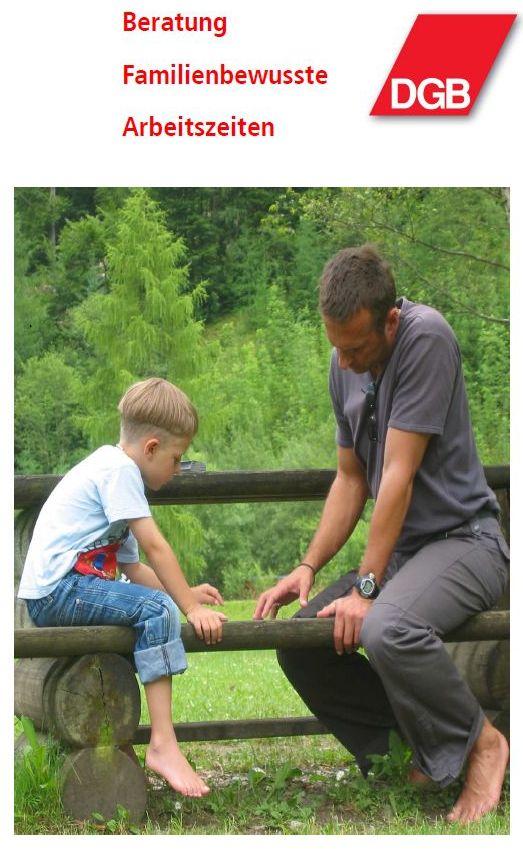
Managing the Reconciliation of Work and Family (Vereinbarkeit von Beruf und Familie Gestalten!)
In brief
The campaign “Managing reconciliation of work and family” is a DGB trade union awareness raising and information initiative. It is a partner project of the company programme ‘Success Factor Family’ – with a focus on changing union and company culture on work-family balance, particularly regarding the involvement of men.
Reconciling work and family life is a core element of the DGB’s gender policy. The focus is on raising awareness about reconciliation through training provided by trade unions (workshops, seminars, specialist conferences), and thus to enable works councils to develop solutions to enhance reconciliation through company agreements. Issues covered include family-conscious working hours and working hours appropriate to different phases of life. Tools include information leaflets and flyers, counselling for companies (provided to some 35 companies), checklists, company agreements and a newsletter. Since 2013 coaching has been introduced for works councils with limited experience of reconciliation. Brochures produced include guidelines on good counselling practices, ‘Men at Work’ which aims to raise awareness about men’s work-life balance; and training modules and measures to sensitive unions and employers in ‘Men’s Task: Reconciliation’.
Training for works councils
The German Federal Ministry for Family Affairs, Senior Citizens, Women and Youth, with the support of the ESF, promotes family-friendly employment practices through a programme for companies called Erfolgsfaktor Familie (Success Factor Family). The Vereinbarkeit von Beruf und Familie Gestalten! (Managing the Reconciliation of Work and Family) project, run by DGB, the German Trade Union Confederation, complements it from the point of view of trade unions and the employees they represent.
The DGB developed the project as part of its role as the representative of the social partners in the Impulse Group of the Allianz für Familie (Alliance for Family).
The project introduces the issue of reconciling work and family life into training provided by trade unions. It runs courses for works councils and staff councils to raise awareness of reconciliation, identify needs, develop solutions and specify rules and policies in collaboration with employers (e.g. in company agreements). The main target groups consist of trade unionists, works councils and staff councils, companies and administrations.
To date the education and training has covered the following topics:
- Reconciliation of work and family: an introduction to the issue as part of the unions’ educational work, to sensitise the organisation’s members. Key topics covered were parental leave, childcare, care and men;
- Family-conscious working hours: the main topics were trends in working time, care-conscious working-hours, shift work, close to full-time work, life-phase oriented working hours, time options and possibilities;
- Life-phase oriented working hours: the key topics were the reconciliation of family and work for young university scientists starting work, appropriate working hours in the family phase (particularly fathers' use of parental supplement and its long-term effects on company and partnership), and time options through working life. Also covered were leaving and returning to work, working close to full-time, reconciliation of paid work, and care and self-care in later adult life.
Tools used include examples of good practice; workshops, seminars and conferences; practice-related recommendations on the key topics; counselling for enterprises and administrations; checklists; company and workplace agreements; and a newsletter.
Counselling for companies
The counselling service for companies has been especially effective. Since 2011, some 35 enterprises have been advised, free of charge and in a company-specific way, how to develop tailor-made solutions in areas such as care-conscious working hours, shift work and difficult working conditions, part-time work and life-phase oriented working hours. The counselling process (up to 6 days of counselling) is systematic and adapted to conditions in the company, and includes the following steps:
- assessing status quo and requirements
- developing joint objectives
- developing corresponding practical approaches and strategies
- monitoring implementation of measures
- support in evaluation
Since 2013 a strategy has been in place for coaching staff councils and works councils with little experience of the reconciliation of family and work. The coaching process (up to 4 days of coaching free of charge) consists of three phases: identification of objectives, raising awareness of family-conscious working time, and analysis of existing resources within the council.
The combination of knowledge transfer with individually tailored counselling and coaching for staff councils, works councils and enterprises constitutes an innovation.
Reconciliation contact points
Furthermore, Reconciliation and work for men constitutes a specific field of action. In this context representatives of corporate interest groups are supported to function as competent points of contact for men. Two brochures on the topic were published. Männer bei der Arbeit (Men at Work) describes current developments in society and motivates readers to deal with the topic of men's work-life balance, while Männersache Vereinbarkeit (Men's Task: Reconciliation) describes a 10-hour training course of 9 modules including measures to sensitise representative bodies.
The project acknowledges and addresses the fact that a company’s culture is of primary importance in improving the reconciliation of family and work, and hence improving gender equality. Works councils and staff councils with an awareness of equal opportunities and family issues can actively steer companies in the right direction – if they have the necessary training and commitment. This good practice is particularly relevant for countries with a strong trade union movement.
Contacts
DGB-Bundesvorstand
Further information
NB image copyright
Image from project flyer: http://familie.dgb.de/++co++192d55a2-5eb1-11e0-625f-00188b4dc422
More on good practices
Downloads
-
Trade unions play their role in the family alliance - Germany
- Language
- EN
- File type and size
- PDF, 402.5 KB